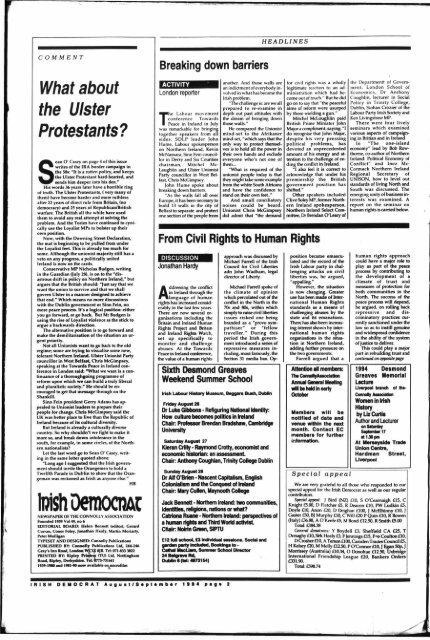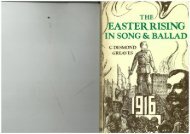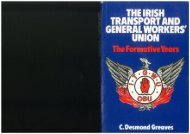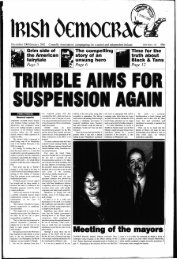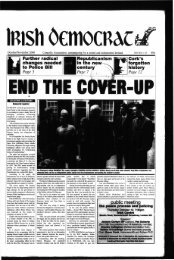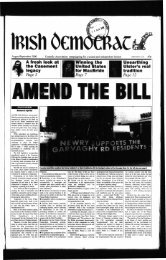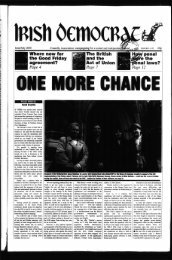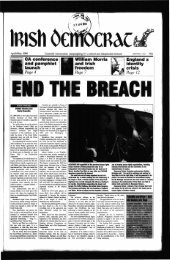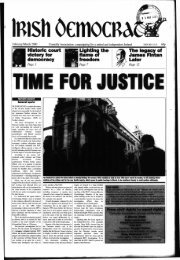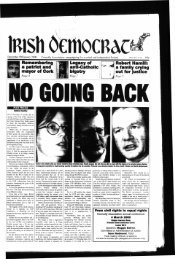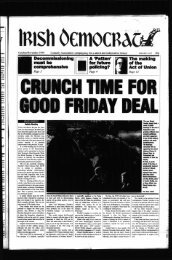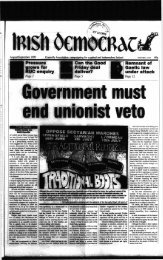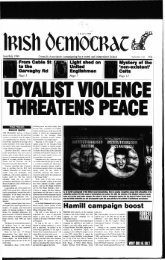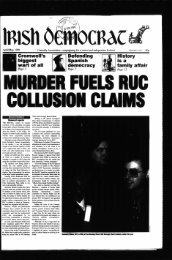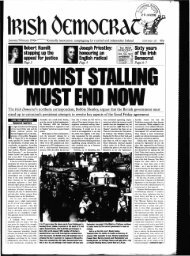You also want an ePaper? Increase the reach of your titles
YUMPU automatically turns print PDFs into web optimized ePapers that Google loves.
HEADLINES<br />
HEADLINES<br />
C O M M E N T<br />
What about<br />
the Ulster<br />
Protestants?<br />
Sean O' Casey on page 4 of this issue<br />
writes of the IRA border campaign in<br />
the 50s: "It is a rotten policy, and keeps<br />
the Ulster Protestant hard-hearted, and<br />
sends him deeper into his den."<br />
His words 36 years later have a horrible ring<br />
of truth. The Ulster Protestants, ( very many of<br />
them) have become harder and more ruthless<br />
after 22 years of direct rule from Britain, (no<br />
democracy) and 25 years of Republican/British<br />
warfare. The British all the while have used<br />
them to avoid any real attempt at solving the<br />
problem. And the Tories have continued to cynically<br />
use the Loyalist MPs to bolster up their<br />
own position.<br />
Now, with the Downing Street Declaration,<br />
the mat is beginning to be pulled from under<br />
the Loyalist feet. This is already too much for<br />
some. Although the unionist majority still has a<br />
veto on any progress, a politically united<br />
Ireland is now on the cards.<br />
Conservative MP Nicholas Budgen, writing<br />
in the Guardian (July 28), is on to the "disastrous<br />
drift in policy on Northern Ireland," but<br />
argues that the British should: "just say that we<br />
want the union to survive and that we shall<br />
govern Ulster in a manner designed to achieve<br />
that end." Which means no more discussions<br />
with the Dublin government or Sinn Fein, no<br />
more peace process. If s a logical position: either<br />
you go forward, or go back. But Mr Budgen is<br />
using the rise of Loyalist violence as the stick to<br />
argue a backwards direction.<br />
The alternative position is to go forward and<br />
make the demilitarisation of the situation an urgent<br />
priority.<br />
Not all Unionists want to go back to the old<br />
regime; some are trying to visualise some new,<br />
tolerant Northern Ireland. Ulster Unionist Party<br />
councillor in West Belfast, Chris McGimpsey,<br />
speaking at the Towards Peace in Ireland conference<br />
in London said: "What we want is a continuance<br />
of a thoroughgoing programme of<br />
reform upon which we can build a truly liberal<br />
and pluralistic society." He should be encouraged<br />
to get that message through on the<br />
Shankill.<br />
Sinn Fein president Gerry Adams has appealed<br />
to Unionist leaders to prepare their<br />
people for change. Chris McGimpsey said the<br />
UK was better place to live than the Republic of<br />
Ireland because of its cultural diversity.<br />
But Ireland is already a culturally diverse<br />
country. So why shouldn't we fight to make it<br />
more so, and break down intolerance in the<br />
south, for example, in some circles, of the Northern<br />
nationalists?<br />
Let the last word go to Sean O' Casey, writing<br />
in the same letter quoted above:<br />
"Long ago I suggested that the <strong>Irish</strong> government<br />
should invite the Orangemen to hold a<br />
Twelfth Parade in Dublin to show that the Orangeman<br />
was reckoned as <strong>Irish</strong> as anyone else."<br />
HB<br />
lnishOemocM<br />
NEWSPAPER OF THE CONNOLLY ASSOCIATION<br />
Founded 1939 Vol 49, no 6<br />
EDITORIAL BOARD: Helen Bennett (editor), Gerard<br />
Curran, Conor Foley, Jonathan Hardy, Martin Moriarty,<br />
Peter Mulligan<br />
TYPESET AND DESIGNED: Connolly Publications<br />
PUBLISHED BY: Connolly Publications Ltd, 244-246<br />
Gray's Inn Road, London WC1X 8JR Tel: 071-633 3022<br />
PRINTED BY: Ripley Printer* (TU) Ltd, Nottingham<br />
Road, Ripley, Derbyshire. Tel: 6773-731641<br />
1939-1980 and 1981-90 now available or^microfilm<br />
Breaking down barriers<br />
ACTIVITY<br />
London reporter<br />
The Labour movement<br />
conference Towards<br />
Peace in Ireland in July<br />
was remarkable for bringing<br />
together speakers from all<br />
sides: SDLP leader John<br />
Hume, Labour spokesperson<br />
on Northern Ireland, Kevin<br />
McNamara, Sinn Fein councillor<br />
in Derry and Six Counties<br />
chairman, Mitchel Mc-<br />
Laughlin and Ulster Unionist<br />
Party councillor in West Belfast,<br />
Chris McGimpsey.<br />
John Hume spoke about<br />
breaking down barriers.<br />
"As the walls fall all over<br />
Europe, it has been necessry to<br />
build 13 walls in the city of<br />
Belfast to separate and protect<br />
one section of the people from<br />
another. And those walls are<br />
an indictment of everybody involved<br />
in what has become the<br />
<strong>Irish</strong> problem.<br />
"The challenge is: are we all<br />
prepared to re-examine in<br />
depth out past attitudes with<br />
the dream of bringing down<br />
those walls."<br />
He compared the Unionist<br />
mind-set to the Afrikaner<br />
mind-set, "which says that the<br />
only way to protect themselves<br />
is to hold all the power in<br />
their own hands and exclude<br />
everyone who's not one of<br />
them...<br />
"What is required of the<br />
unionist people today is that<br />
they might take some example<br />
from the white South Africans<br />
and have the confidence to<br />
stand on their own feet.."<br />
And small conciliatory<br />
noises could be heard.<br />
Unionist Chris McGimpsey<br />
did admit that "the demand<br />
for civil rights was a wholly<br />
legitimate reaction to an administration<br />
which had become<br />
out of touch." But he did<br />
go on to say that "the peaceful<br />
aims of reform were usurped<br />
by those wielding a gun."<br />
Mitchel McLoughlin paid<br />
British Prime Minister John<br />
Major a compliment, saying: "I<br />
do recognise that John Major,<br />
despite his very pressing<br />
political problems, has<br />
devoted an unprecedented<br />
amount of his energy and attention<br />
to the challenge of ending<br />
the conflict in Ireland.<br />
"I also feel it is correct to<br />
acknowledge that under his<br />
premiership the British<br />
government position has<br />
shifted."<br />
Other speakers included<br />
Clive Soley MP, former Northern<br />
Ireland spokesperson,<br />
Northern Ireland Select Committee,<br />
Dr Brendan O'Leary of<br />
From Civil Rights to Human Rights<br />
DISCUSSION<br />
Jonathan Hardy<br />
Addressing the conflict<br />
in Ireland through the<br />
language of human<br />
rights has increased considerably<br />
in the last few years.<br />
There are now several organisations<br />
including the<br />
Britain and Ireland Human<br />
Rights Project and Britain<br />
and Ireland Rights Watch,<br />
set up specifically to<br />
moniter and challenge<br />
abuses. At the Towards<br />
Peace in Ireland conference,<br />
the value of a human rights<br />
approach was discussed by<br />
Michael Fairell of the <strong>Irish</strong><br />
Council for Civil Liberties<br />
adn John Wadham, legal<br />
director of Liberty.<br />
Sixth Desmond Greaves<br />
Weekend Summer School<br />
<strong>Irish</strong> Labour History Museum, Beggars Bush, Dublin<br />
Friday <strong>August</strong> 26<br />
Dr Luke Gibbons • Refiguring National Identity:<br />
How culture becomes politics in Ireland<br />
Chair: Professor Brendan Bradshaw, Cambridge<br />
University<br />
Saturday <strong>August</strong> 27<br />
Kieran Crilly - Raymond Crotty, economist and<br />
economic historian: an assessment<br />
Chair: Anthony Coughlan, Trinity College Dublin<br />
Sunday <strong>August</strong> 28<br />
Dr Alt O'Brien - Nascent Capitalism, English<br />
Colonialism and the Conquest of Ireland<br />
Chair: Mary Cullen, Maynooth College<br />
Jack Bennett - Northern Ireland: two communities,<br />
identities, religions, nations or what?<br />
Catriona Ruane - Northern Ireland: perspectives of<br />
a human rightsand Third World activist<br />
Chair: Noirin Green, SIPTU<br />
£12 full school, £3 individual sessions. Social and<br />
garden party included, Bookings to •<br />
Cathal MacUam, Summer School Director<br />
24 Belgrave Rd,<br />
Dublin 6 (tel: 4973154)<br />
IRISH DEMOCRAT A u g u s t / S e p t e m b e r 1 9 94 page 2<br />
Michael Farrell spoke of<br />
the climate of opinion<br />
which percolated out of the<br />
conflict in the North in the<br />
70s and 80s, within which<br />
simply to raise civil liberties<br />
issues risked one being<br />
branded as a "provo sympathiser"<br />
or "fellow<br />
traveller." During this<br />
period the <strong>Irish</strong> government<br />
introduced a series of<br />
repressive measures including,<br />
most famously, the<br />
Section 31 media ban. Opposition<br />
became emasculated<br />
and the record of the<br />
<strong>Irish</strong> Labour party in challenging<br />
attacks on civil<br />
liberties was, he argued,<br />
"appalling."<br />
However, the situation<br />
is now changing. Greater<br />
use has been made of International<br />
Human Rights<br />
standards as a means of<br />
challenging abuses by the<br />
state and its emanations.<br />
There has also been increasing<br />
interest shown by international<br />
human rights<br />
organisations in the situation<br />
in Northern Ireland,<br />
adding further pressure on<br />
the two governments.<br />
Farrell argued that a<br />
Attention all members:<br />
The ConnoHyAssociation<br />
Annual General Meeting<br />
will be held in early<br />
October<br />
Members will be<br />
notified of date and<br />
venue within the next<br />
month. Contact EC<br />
members for further<br />
information.<br />
Special<br />
appeal<br />
the Departmentt of Government,<br />
London School of<br />
Economics, Dr Anthony<br />
Coughlin, lecturer in Social<br />
Policy in Trinity College,<br />
Dublin, Siohan Crozier of the<br />
Labour Party <strong>Irish</strong> Society and<br />
Ken Livingstone MP.<br />
There were four lively<br />
seminars which examined<br />
various aspects of campaigning<br />
in Britian and in Ireland<br />
In "The one-island<br />
economy" lead by Bob Rowthorne,<br />
co-author of Northern<br />
Ireland: Political Economy of<br />
Conflict" and Inez Mc-<br />
Cormack Northern Ireland<br />
Regional Secretary of<br />
UNISON, how to level out<br />
standards of living North and<br />
South was discussed. The<br />
emerging unity of business interests<br />
was examined. A<br />
report on the seminar on<br />
human rights is carried below.<br />
human rights approach<br />
could have a major role to<br />
play as part of the peace<br />
process by contributing to<br />
the development of a<br />
climate of trust and<br />
measures of protection for<br />
both communities in the<br />
North. The success of the<br />
peace process will depend,<br />
he argued, on rolling back<br />
repressive and discriminatory<br />
practices currently<br />
sanctioned under the<br />
law so as to instill genuine<br />
and widespread confidence<br />
in the ability of the system<br />
of justice to deliver.<br />
This could play a major<br />
part in rebuilding trust and<br />
continued on opposite page<br />
<strong>1994</strong> Desmond<br />
Greaves Memorial<br />
Lecture<br />
Liverpool branch<br />
of the-<br />
Connolly Association<br />
Women in <strong>Irish</strong><br />
History<br />
by Liz Curtis<br />
Author and Lecturer<br />
on Saturday<br />
<strong>September</strong> 17<br />
at 1.30 pm<br />
At Merseyside Trade<br />
Union Centre,<br />
Hardman Street,<br />
Liverpool<br />
We are very grateful to all those who responded to our<br />
special appeal for the <strong>Irish</strong> <strong>Democrat</strong> as well as our regular<br />
contributors.<br />
Special appeal: J Bird (NZ) £10, S O'Cearnaigh £15, C<br />
Knight £5.00, D Fletcher £5, R Deacon £10, PW Ludkin £5,<br />
Dovle £10, Anon £20, D Deighan £100, J McElhinny £10, J<br />
Gaster £50, BJ Murphy £10, C Will £20 P Quin £10, R Bowen<br />
(Italy) £36.88, A O'Keefe £5, M Bond £12.50, R Smith £5.00<br />
Total: £384.38<br />
General donations: Y Boydell £3, Sheffield CA £25, T<br />
Donaghy £10, Sfek Healy £3, F Jennings £15, F»o Coulton £10,<br />
D Crasher £10, A Terson £100, Camden Trades Council £5,<br />
H Kelsey £20, M Melly £12.50, P O'Connor £10, J Egan 50p, J<br />
Morrissey (Australia) £10.34, O Donohue £12.50, Uxbridge<br />
International Friendship League £20, Bankers Orders<br />
£331.90.<br />
Total: £598.74<br />
\<br />
BBC exposed in the US<br />
CENSORSHIP<br />
James Mullin USA<br />
The US Human Rights<br />
Watch / Free Expression<br />
Project has<br />
severely criticised the US<br />
distributor of BBC World<br />
Service because of British<br />
media cesorship.<br />
The president of the<br />
Human Rights Watch,<br />
Gara LaMarche sent a<br />
scathing letter to American<br />
Public Radio earlier this<br />
year. The letter to APR's<br />
president, Stephen L<br />
Salyer, made an irrefutable<br />
case that the BBC is subject<br />
to the broadcast ban which<br />
amounts to "institutionaliised<br />
state censorship"<br />
and that it was an<br />
inappropriate news source<br />
for a publicly funded entity<br />
such as APR."<br />
The letter urges APR to<br />
use alternate news sources<br />
until the ban is lifted, or,<br />
"at a minimum, to precede<br />
BBC reports with disclaimers<br />
that explain to listeners<br />
the nature of the<br />
broadcasting ban and its effects<br />
on BBC productions."<br />
Human Rights Watch<br />
points out that the broadcast<br />
ban forbids direct<br />
broadcast of words by any<br />
person that support or<br />
solicit support for<br />
proscribed organisations,<br />
and prohibits the broadcast<br />
of any statement by a person<br />
"who represents or<br />
purports to represent" one<br />
of these organisations.<br />
"This type of politicallydefined<br />
censorship is a<br />
dangerous intrusion by the<br />
state into the realm of free<br />
expression. In this case, it<br />
severely restricts efforts to<br />
provide equitable and<br />
complete coverage of the<br />
events in Northern<br />
Ireland."<br />
APR receives funding<br />
from the Corporation for<br />
Public Broadcasting (CPB)<br />
which was formed by the<br />
Public Broadcasting Act of<br />
1967. According to the Act,<br />
Britain holds the key<br />
ACTIVITY<br />
Glasgow reporter<br />
The Glasgow branch of<br />
the Connolly Association<br />
held a public<br />
meeting on Saturday June<br />
25th in the City Halls<br />
where the speaker was the<br />
former Belfast correspondent<br />
of the <strong>Irish</strong> <strong>Democrat</strong>,<br />
Jack Bennett.<br />
The theme of the meeting<br />
was "How to bring<br />
peace to Ireland", and Jack,<br />
a Northern Protestant currently<br />
living in Dublin was<br />
warmly received by a<br />
small, but appreciative<br />
audience.<br />
Prospects for peace in<br />
Ireland have never been<br />
better during the last 25<br />
Human Rights<br />
for a recourse to armed<br />
struggle.<br />
A human rights approach<br />
can, Farrell said, play an important<br />
role in addressing<br />
the fears of Northern <strong>Irish</strong><br />
Protestants under future<br />
constitutional arrangements<br />
involving the Dublin<br />
government.<br />
Both speakers highlighted<br />
the way in which "emergency"<br />
legislation has seeped<br />
into general law. John-<br />
Wadham of Liberty spoke<br />
about the impact of legislation<br />
introduced into Northern<br />
Ireland on people in<br />
Britain such as the PTA.<br />
Much contemporary legislation<br />
has now become effectively<br />
permanent. In<br />
particular, the PTA covers<br />
international terrorism as<br />
well as that associated with<br />
years, said Jack. Much of<br />
the credit for this had to go<br />
to the <strong>Irish</strong> peace initiative<br />
promoted by John Hume<br />
and Gerry Adams This has<br />
helped to chfinge the political<br />
agenda and put the<br />
whole question of <strong>Irish</strong><br />
self-determination centrestage.<br />
However a great<br />
deal of serious work still<br />
has to be done both in<br />
Ireland and in Britain if a<br />
just and lasting peace is to<br />
be acheived.<br />
Since the responsibility<br />
for the Anglo-<strong>Irish</strong> conflict<br />
lay with successive British<br />
governments, it should be<br />
obvious to all fair minded<br />
people that the present<br />
British government led by<br />
John Major has a responsibility<br />
to create the necessary<br />
conditions for peace to<br />
become a realisable goal.<br />
Northern Ireland, and, so,<br />
he argued that it would be<br />
extremely difficult politically<br />
to remove PTA law<br />
from the statute books in<br />
the UK.<br />
HP spoke of the many inst<br />
inces of miscarriages of<br />
justice and strongly<br />
criticised the May inquiry<br />
into the Guildford Four.<br />
This, he said, had been no<br />
more than a whitewash of<br />
the system, falling back on<br />
the "rotten apple" theory of<br />
errant, individuals as a<br />
means of evading responsibility<br />
for fundamental<br />
i ailures in the criminal justice<br />
system which required<br />
urgent reform. May's approach<br />
was wrong in fact<br />
and wrong in principle.<br />
After this lengthy process,<br />
no individuals within the<br />
CPB must "carry out its<br />
purposes and functions...in<br />
ways that will most effectively<br />
assure the maximum<br />
freedom of the public<br />
telecommunications entities<br />
and systems from interference<br />
with, or control<br />
of, program content..."<br />
The Act specifically<br />
does not authorise control<br />
by any US government official<br />
over the content of<br />
public telecommunications.<br />
According the CPB<br />
itself, it is required by the<br />
Act to "strive for objectivity<br />
and balance in the<br />
controversial programmes<br />
that it funds."<br />
In addition, Congress<br />
has made it clear that "CPB<br />
is to emphasise maximum<br />
protectionfrom interference in<br />
programme content to allow<br />
the greatest freedom for the<br />
expression of ideas from<br />
diverse sources."<br />
The Human Rights<br />
Watch / Free Expression<br />
project letter comes to a<br />
logical and devastating<br />
It was Britain that partitioned<br />
Ireland against the<br />
wishes of the majority, and<br />
created the sectarian Norrther<br />
Ireland statelet which<br />
has consistently repressed<br />
and sytematically discriminated<br />
against Roman<br />
Catholics trapped within<br />
its artificial border. The<br />
provisional IRA was a<br />
response to events that occured<br />
within that area, and<br />
in a sense was produced by<br />
the palace of Westminster<br />
not the inhabitants of the<br />
Falls Road.<br />
Despite recent claims by<br />
the British government<br />
"that they have no selfish<br />
strategic or ecoonomic interest<br />
in Northern<br />
Ireland," Northern Ireland<br />
remains a British colony.<br />
Britain still claims<br />
soveriegnity over the six<br />
criminal justice system will<br />
be publicly held to account,<br />
while the report itself contributes,<br />
despite its textual<br />
denials, to the whispering<br />
campaign against the innocence<br />
of the Four.<br />
Wadham described how<br />
the Criminal Justice Bill<br />
now going through Parliament<br />
imports parts of the<br />
Emergency Powers Act (N.<br />
Ireland) into domestic law;<br />
such as provisions on<br />
"going equipped for terrorism."<br />
These measures place the<br />
onus of proof on the accused,<br />
who will have to<br />
prove that their equipment<br />
(fertiliser? clock?) or information<br />
(journalist's contact<br />
book?) will not be used in<br />
terrorist acts.<br />
conclusion for CPB and<br />
APR:<br />
"Having forbidden influence<br />
in US public broadcasting<br />
by the US<br />
government, there is no reason<br />
to suppose that Congress<br />
would take a different view in<br />
regard to influence by British<br />
government in US public<br />
broadcasting. APR's distribution<br />
of BBC broadcasts, then,<br />
appears to violate not only the<br />
basic precepts of free expression<br />
and full disclosure, but<br />
Congressional intent as well."<br />
American Public Radio,<br />
(soon to be called Public<br />
Radio International) is actively<br />
undermining our<br />
First Ammendment Rights<br />
by disseminating British<br />
government censored<br />
"news" in the US, and the<br />
Corporation for Public<br />
Broadcasting is aiding,<br />
abetting and financing a<br />
multitude of lies.<br />
James Mullin is president<br />
of the <strong>Irish</strong> American Unity<br />
Conference, South Jersey<br />
Chapter.<br />
counties via section 75 of<br />
the Government of Ireland<br />
Act, and maintains the<br />
constitutional guarantee<br />
whiclii allows the<br />
Unionists to block political<br />
progress. The power to<br />
move the situation on,<br />
therefore, is in the hands of<br />
the British government.<br />
This government must<br />
be compelled to use its<br />
power and resources to<br />
promote change that is<br />
consistent with basic<br />
democratic principles.<br />
This is where the labour<br />
and democratic move<br />
mentsin Britain can play a<br />
vital role. Influence on<br />
these movements can be<br />
exercised by the <strong>Irish</strong> community<br />
in Britain.<br />
Free at last.<br />
Congratulations to Kate<br />
Magee who was found innocent<br />
of the charge under the<br />
Prevention of Terrorism Act of<br />
"withholding information."<br />
The Derbyshire-based Kate<br />
Magee support group welcomed<br />
the outcome, but expressed<br />
anger at the decision<br />
of the Crown Prosecution Service<br />
to procede with the case in<br />
the first place.<br />
WORLD COMMENT<br />
BY P OLITIC U S<br />
A World of 500<br />
countries?<br />
That was the headline of the front page lead article<br />
in the Wall Street Journal of June 20 last.<br />
The house journal of US finance capitalism,<br />
whose job it is to keep rich Americans informed<br />
of the real world trends, seems to be<br />
echoing a view often suggested in this column, that<br />
humanity is still at a relatively early stage in the formation<br />
of nation states.<br />
"It is a paradox of global proportions," said the article,<br />
"The closer that trade and technology bind nations<br />
together, the bolder the moves to break nations<br />
apart. Who would have expected all this? Following<br />
World War 2, many predicted that a global economy<br />
and global communications would lead to a worldwide<br />
community. Nationalism, they said, would<br />
decline, as ever more people saw us all as passengers<br />
on lifeboat Earth.<br />
"But the growth of the global economy and of more<br />
powerful transnational institutions is producing the<br />
opposite effect. Instead of fading away, nationalism is<br />
flourishing, and not just in the war-ravaged Balkans.<br />
Now, even tiny groups of people can contemplate<br />
breaking away from the central state and plugging<br />
into the world economy on their own. Regions nursing<br />
ancient grievances are claiming independence, or<br />
at least autonomy, confident they aren't committing<br />
economic suicide.<br />
"At the same time the big corporations and institutions<br />
shaping the world economy seem so remote that<br />
many people turn to local ethnic groups and obscure<br />
languages for their identity, furthering the world's<br />
political fragmentation."<br />
And the new nations n«fWork at every opportunity.<br />
Early this year in Davos, Switzerland, the prime ministers<br />
of Estonia and the Czech Republic - two nation<br />
states that didn't exist five years ago - huddled with<br />
Argentina's finance minister to discuss financial<br />
strategy. Tamils use the Internet computer network to<br />
discuss politics with Quebecers and Slovenians, bypassing<br />
the big power centres they would once have<br />
had to go through. The end of the cold war has<br />
loosened blocks of countries once bound in tense allegiance<br />
to the superpowers.<br />
One wishes that more people in the labour movement<br />
knew how to take more advantage of the trend<br />
in the formation of new nation states, rather than<br />
seeing it as just a manifestation of nasty nationalism.<br />
The left has traditionally neglected the factors making<br />
for state boundaries and has often paid a costly price<br />
for doing so.<br />
The United Nations had fewer than 50 member<br />
states when it came into being after World War 2.<br />
Today it has nearly 200. In Europe, the number of<br />
states has risen from 34 in 1989 to 52 at the last count.<br />
The process of nation state formation is clearly unfinished<br />
even in Western Europe. Is not Scottish independence<br />
inevitable in time? And that of Wales and<br />
Catalonia, Wallonia and Flanders, and maybe others?<br />
And if that is the case in Western Europe, where<br />
governments have been quarrelling with one another<br />
to settle stable state boundaries for centuries, how<br />
much more likely is it in Eastern Europe? And what<br />
will be the situation in Africa, Asia and the Middle<br />
East in the coming century, where virtually all the<br />
state boundaries were drawn by the colonial powers,<br />
without the indigenous people being in any way consulted?<br />
There are over 2,000 distinct languages in the<br />
world, after all, and as many ethnic groups.<br />
So a world of 500 countries is quite likely. The Wall<br />
Street Journal, though, does not give the cause of the<br />
national and ethnic self-asseitiveness it discusses. The<br />
impetus to form a nation state comes from the fact that<br />
it is generally only on the basis of the national community<br />
that sufficient solidarity, mutual identification<br />
and mutuality of interest develop among people as to<br />
induce minorities freely to agree to majority rule, so<br />
providing a realistic basis for a stable democracy.<br />
We are still seeing the working out of the core impulse<br />
of the 1789 French Revolution, which asserted<br />
the right of nations to selMetennination as one of die<br />
Rights of Man. How far sftfrig was the Chinese<br />
Foreign Minister Chou En*Lai, who, when asked for<br />
his estimate of the French Revolution, said: It is too<br />
early to say!"<br />
IRISH DEMOCRAT A u g u s t / S e p t e m b e r 1 9 9 4 psge 3


